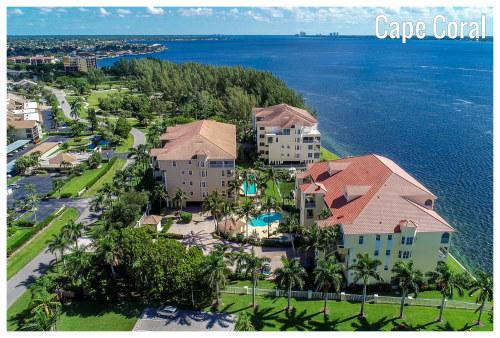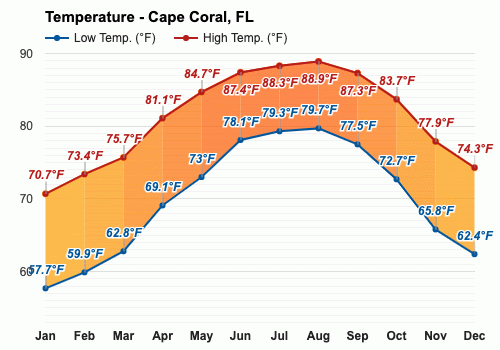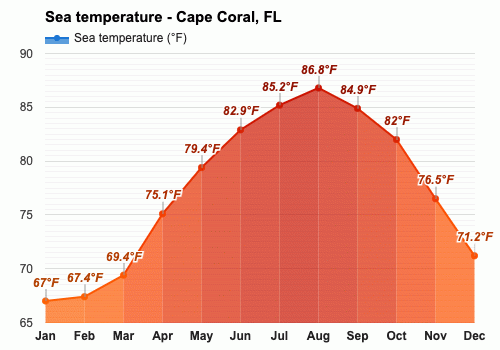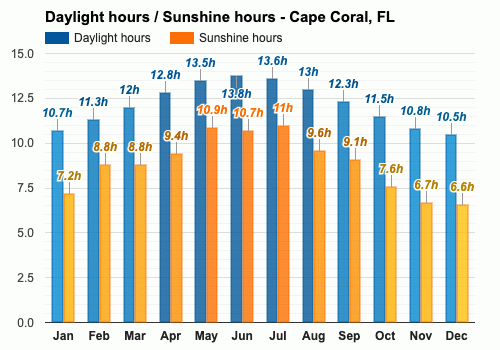Contents
- The climate of Cape Coral
- The best time to visit Cape Coral
- The worst time to visit Cape Coral
- Spring weather in Cape Coral
- Summer weather in Cape Coral
- Autumn weather in Cape Coral
- Winter weather in Cape Coral
- Weather in January
- Weather in February
- Weather in March
- Weather in April
- Weather in May
- Weather in June
- Weather in July
- Weather in August
- Weather in September
- Weather in October
- Weather in November
- Weather in December
- Frequently asked questions
- Average temperature
- Average pressure
- Average wind speed
- Average humidity
- Average rainfall
- Average rainfall days
- Average sea temperature
- Average daylight
- Average sunshine
- Average sunshine days
- Average UV index
- Average cloud cover
- Average visibility

The climate of Cape Coral
Throughout the months, temperatures vary, reaching their pinnacle in July and August with values up to 88.9°F (31.6°C), while touching their low in January with a subtle 57.7°F (14.3°C). Relative humidity dances around the 71% to 76% mark, peaking slightly in the autumn. Rainfall distribution appears as more than just a summer-time phenomenon, with volumes surging from May to September and reaching a yearly high of 3.94" (100mm) in August. Substantial rain marks these months, accompanied by an increased number of rainy days, notably peaking at 24 days in August.
This environment is also characterized by reliably high sea temperatures, culminating near 86.8°F (30.4°C) in August. The sun makes its presence strongly felt with an excess of 10.5 hours of daylight on average throughout the year. However, pure sunshine hours are at their highest from May to August, where they stretch close to or surpass 10 hours. Concurrently, sunshine days are less abundant during these periods, presenting a contrasting weather peculiarity.
The best time to visit Cape Coral
The worst time to visit Cape Coral
Spring weather in Cape Coral
Summer weather in Cape Coral
Autumn weather in Cape Coral
Winter weather in Cape Coral
Weather in January
Weather in February
Weather in March
Weather in April
Weather in May
Weather in June
Weather in July
Weather in August
Weather in September
Weather in October
Weather in November
Weather in December
Frequently asked questions
What month is the coldest in Cape Coral?
How much does it rain in Cape Coral?
What is the month with the coldest ocean in Cape Coral?
When is the lowest UV index in Cape Coral?
What is the driest month in Cape Coral?
What is the least humid month in Cape Coral?
When is Daylight Saving Time (DST) in Cape Coral?
What are the months with the highest UV index in Cape Coral?
When are the longest days in Cape Coral?
What month has the most sunshine in Cape Coral?
What time of the year is the hottest in Cape Coral?
What is the wettest month in Cape Coral?
What is the month with the warmest ocean in Cape Coral?
What are the most humid months in Cape Coral?
What is the month with the shortest days in Cape Coral?
What is the month with the least sunshine in Cape Coral?
Average temperature
Cape Coral, FL

The warmest month (with the highest average high temperature) is August (88.9°F).
The month with the lowest average high temperature is January (70.7°F).
The month with the highest average low temperature is August (79.7°F).
The coldest month (with the lowest average low temperature) is January (57.7°F).
Average pressure
Cape Coral, FL

- Average pressure in January:
30.12"Hg - Average pressure in February:
30.09"Hg - Average pressure in March:
30.08"Hg - Average pressure in April:
30.01"Hg - Average pressure in May:
30"Hg - Average pressure in June:
29.99"Hg
- Average pressure in July:
30.02"Hg - Average pressure in August:
29.98"Hg - Average pressure in September:
29.95"Hg - Average pressure in October:
29.96"Hg - Average pressure in November:
30.05"Hg - Average pressure in December:
30.09"Hg
The month with the highest atmospheric pressure is January (30.12"Hg).
The month with the lowest atmospheric pressure is September (29.95"Hg).
Average wind speed
Cape Coral, FL

- Average wind speed in January:
8.5mph - Average wind speed in February:
8.1mph - Average wind speed in March:
8.5mph - Average wind speed in April:
8.3mph - Average wind speed in May:
7.7mph - Average wind speed in June:
6.5mph
- Average wind speed in July:
6.2mph - Average wind speed in August:
6.5mph - Average wind speed in September:
7mph - Average wind speed in October:
8.7mph - Average wind speed in November:
8.6mph - Average wind speed in December:
8.3mph
The windiest month (with the highest average wind speed) is October (8.7mph).
The calmest month (with the lowest average wind speed) is July (6.2mph).
Average humidity
Cape Coral, FL

The months with the highest relative humidity are September and December (76%).
The month with the lowest relative humidity is March (71%).
Average rainfall
Cape Coral, FL

- Average rainfall in January:
0.47" - Average rainfall in February:
0.43" - Average rainfall in March:
0.43" - Average rainfall in April:
0.63" - Average rainfall in May:
1.65" - Average rainfall in June:
2.32"
- Average rainfall in July:
2.95" - Average rainfall in August:
3.94" - Average rainfall in September:
2.6" - Average rainfall in October:
1.42" - Average rainfall in November:
0.51" - Average rainfall in December:
0.59"
The wettest month (with the highest rainfall) is August (3.94").
The driest months (with the least rainfall) are February and March (0.43").
Average rainfall days
Cape Coral, FL

- Average rainfall days in January:
6.5 days - Average rainfall days in February:
6.2 days - Average rainfall days in March:
8.3 days - Average rainfall days in April:
10.3 days - Average rainfall days in May:
14.4 days - Average rainfall days in June:
18.1 days
- Average rainfall days in July:
20.9 days - Average rainfall days in August:
24 days - Average rainfall days in September:
21.2 days - Average rainfall days in October:
12.5 days - Average rainfall days in November:
7.2 days - Average rainfall days in December:
6.8 days
The month with the highest number of rainy days is August (24 days).
The month with the least rainy days is February (6.2 days).
Average sea temperature
Cape Coral, FL

The best month for swimming (with the highest average sea temperature) is August (86.8°F).
The coldest month (with the lowest average sea temperature) is January (67°F).
Average daylight / Average sunshine
Cape Coral, FL

- Average daylight in January:
10h and 4min - Average daylight in February:
11h and 2min - Average daylight in March:
12h and 0min - Average daylight in April:
12h and 5min - Average daylight in May:
13h and 3min - Average daylight in June:
13h and 5min
- Average daylight in July:
13h and 4min - Average daylight in August:
13h and 0min - Average daylight in September:
12h and 2min - Average daylight in October:
11h and 3min - Average daylight in November:
10h and 5min - Average daylight in December:
10h and 3min
The month with the longest days is June (Average daylight: 13h and 48min).
The month with the shortest days is December (Average daylight: 10h and 30min).
- Average sunshine in January:
7h and 1min - Average sunshine in February:
8h and 5min - Average sunshine in March:
8h and 5min - Average sunshine in April:
9h and 2min - Average sunshine in May:
10h and 5min - Average sunshine in June:
10h and 4min
- Average sunshine in July:
11h and 0min - Average sunshine in August:
9h and 4min - Average sunshine in September:
9h and 1min - Average sunshine in October:
7h and 4min - Average sunshine in November:
6h and 4min - Average sunshine in December:
6h and 4min
The month with the most sunshine is July (Average sunshine: 11h and 0min).
The month with the least sunshine is December (Average sunshine: 6h and 36min).
Average sunshine days
Cape Coral, FL

- Average sunshine days in January:
22.8 days - Average sunshine days in February:
20.5 days - Average sunshine days in March:
20.8 days - Average sunshine days in April:
17.4 days - Average sunshine days in May:
13.4 days - Average sunshine days in June:
8.3 days
- Average sunshine days in July:
6.9 days - Average sunshine days in August:
5.3 days - Average sunshine days in September:
5.8 days - Average sunshine days in October:
16.1 days - Average sunshine days in November:
20.6 days - Average sunshine days in December:
21.9 days
The month with the most sunshine days is January (22.8 days).
The month with the least sunshine days is August (5.3 days).
Average UV index
Cape Coral, FL

The months with the highest UV index are May, June, July, August and September (UV index 7).
The month with the lowest UV index is January (UV index 4).
Average cloud cover
Cape Coral, FL

The month with the most cloud cover is January (Cloud cover 29).
The months with the least cloud cover are March and May (Cloud cover 24).
Average visibility
Cape Coral, FL

The months with the highest visibility are January, February, March, April, May, June, July, August, September, October, November and December (6mi).
The months with the lowest visibility are January, February, March, April, May, June, July, August, September, October, November and December (6mi).
Cape Coral, Florida, USA
Weather forecast for your location
2. Allow the app to use your location


